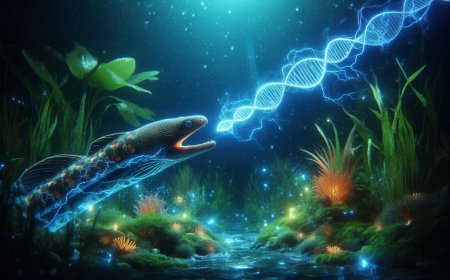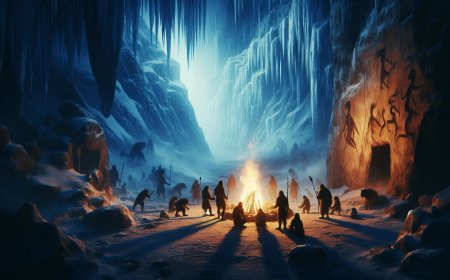The Birth of the Scientist: A Word That Shaped the Future
Explore 'The Birth of the Scientist,' a visual journey that captures the essence of scientific discovery and curiosity. This image symbolizes the transformative power of knowledge and the spirit of inquiry that shaped our future.

In the mid-19th century, amidst the corridors of Cambridge University, a quiet revolution was taking place—not in laboratories or lecture halls, but in the mind of one man, William Whewell. As a philosopher, historian, and polymath, Whewell's influence spanned far and wide, but his most lasting legacy would not be a scientific theory or a groundbreaking experiment. Instead, it would be a simple word that forever changed how we understand the world’s greatest explorers of knowledge: scientist.
Before this term came into being, the people who uncovered the mysteries of the natural world were known by different titles. Isaac Newton was a natural philosopher, his work rooted in abstract thinking and speculative reasoning. Charles Darwin, whose theories would transform biology, might have been called a savant, a term for the learned few. In Germany, the term naturforscher—literally, "nature investigator"—was occasionally used. Each of these titles carried weight, but they also reflected a fragmented view of the sciences, as if physics, biology, and chemistry were isolated pursuits rather than parts of a shared mission to unlock the universe’s secrets.
Whewell saw things differently. As someone who moved effortlessly between disciplines, from mathematics to geology to theology, he believed that the work of understanding nature should be united under one banner. He sought a term that would connect these disparate fields and recognize the artistry behind scientific discovery. Science, like art, was a creative process—one of imagination, intuition, and vision as much as of logic and evidence. The natural world was not just to be studied but interpreted and understood through human creativity.
In 1833, while writing “The Philosophy of the Inductive Sciences,” Whewell pondered over this missing word. How could he describe those who dedicated their lives to the pursuit of knowledge, who mapped the stars, uncovered the forces of gravity, or peered into the microscopic worlds hidden from view? Several options floated in his mind, but none quite captured the essence of this collective journey. Then, a thought struck him—scientist, a term he fashioned in the likeness of “artist.” Just as artists crafted beauty and meaning from colors and shapes, scientists brought order and understanding from the chaos of nature. The name fit.
But Whewell hesitated. In those days, words ending in “-ist” were associated with economists or atheists, and these titles often carried negative connotations. Would “scientist” suffer the same fate, tarnishing the noble work of scientific inquiry? For a moment, he considered abandoning the term. Yet the idea had taken root, and Whewell ultimately embraced it, believing that the power of science would give the word strength.
He was right. The term scientist quickly gained traction, spreading first through academic circles and then into the wider public. At last, there was a way to describe those who sought to explain the mysteries of both the stars and the cells, who traversed the farthest reaches of human understanding. This single word unified all the fields of study, whether a person was splitting atoms or classifying plants. It captured the spirit of discovery and the shared pursuit of truth that bound them together.
The arrival of the word "scientist" was more than a linguistic shift; it was a recognition of the ingenuity and creativity required to explore the natural world. Just as the artist’s brush creates beauty from nothing, the scientist’s mind brings light to the unknown. The title acknowledged that scientific discovery was not a mechanical or rigid process, but one that required insight, curiosity, and imagination. It embraced the idea that science, too, was an art form, one that painted the future with the bold strokes of reason and innovation.
Over time, the word scientist became inseparable from the people who carried its mantle. Marie Curie, Albert Einstein, Rosalind Franklin, and Stephen Hawking—all would wear the title proudly, their work shaped not just by cold facts but by a visionary spirit. Today, the word scientist commands universal respect, encompassing every discipline from astronomy to zoology. It’s a term that unites a diverse community of thinkers and dreamers who, despite the differences in their fields, are bound by the same quest for understanding.
As we look to the future, the term scientist continues to inspire new generations of explorers, reminding us that science is not just about finding answers, but about seeking them. Like artists who draw inspiration from the world around them, scientists look at the same stars, forests, and oceans and see endless possibilities. And it all began with a single word that captured the imagination and creativity at the heart of scientific endeavor.
In the end, William Whewell’s quiet contribution was nothing short of revolutionary. The word "scientist" didn’t just fill a gap in the language—it redefined what it meant to engage with the natural world. It reminded us that science, like art, is a craft, and those who practice it are not merely gatherers of facts, but creators of knowledge, shaping the future with every discovery they make.
What's Your Reaction?







































































































